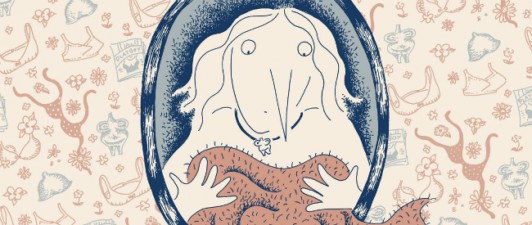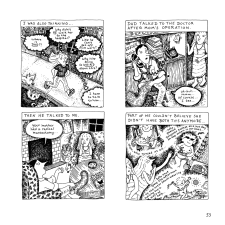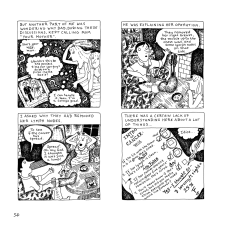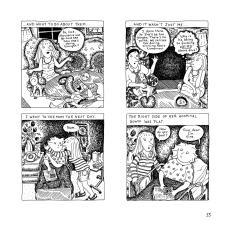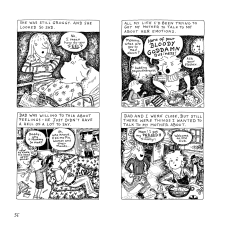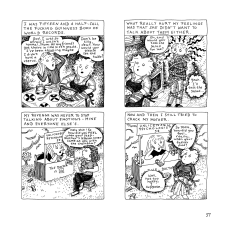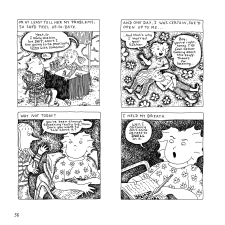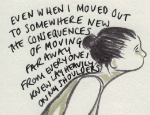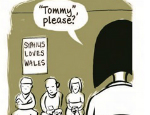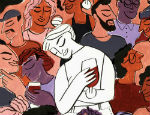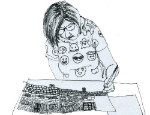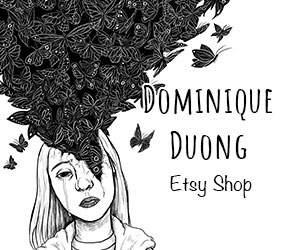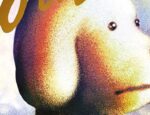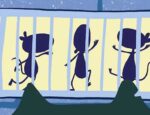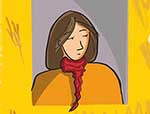Despite its attention-grabbing title, Jennifer Hayden’s powerful and hugely enjoyable graphic memoir offers moving and often hilarious insight into every stage of a woman’s life.
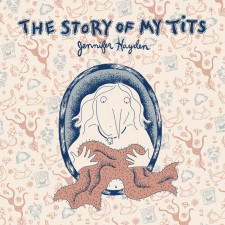 As Breast Cancer Awareness Month continues, The Story of My Tits by Jennifer Hayden (Underwire) is a timely release. However, this is a book that contains multitudes, crackling with energy and covering decades of experience; to pigeonhole it as a ‘cancer memoir’ would be to do it a disservice. It’s also one of my books of the year so far.
As Breast Cancer Awareness Month continues, The Story of My Tits by Jennifer Hayden (Underwire) is a timely release. However, this is a book that contains multitudes, crackling with energy and covering decades of experience; to pigeonhole it as a ‘cancer memoir’ would be to do it a disservice. It’s also one of my books of the year so far.
As Top Shelf’s blurb states, the diagnosis of breast cancer (and subsequent radical surgery) that the book leads up to made Hayden realise “that her tits told a story. Across a lifetime they’d held so many meanings… And then they were gone.” However, the fact that the diagnosis comes more than two-thirds of the way through the book highlights how much more is going on here.
The book starts with Hayden’s childhood, her first concerns about being flat-chested and her awkward entry into the confusing world of bras. However, although her mother has her own experience with breast cancer, it doesn’t take long to realise that there’s much more to this book than tits – the author’s or anyone else’s. It’s just as enthralling when dealing with the other issues of her young life, such as the revelation of her dad’s infidelity and her mother’s strangely compliant acceptance of it.
That episode highlights the narrative voice that Hayden uses throughout; even in the most intense or intimate of moments, she remains objective enough to deliver an incisive and candid assessment of the events or people involved. Her honest and earthy approach keeps sentimentality at arm’s length, and this certainly isn’t a tale of saintly endurance; her fears, anger and regrets are laid out as tangibly as her moments of joy.
However, Hayden doesn’t just manage to capture the emotion of a moment with the clarity of hindsight. She also has an eye for a telling image or metaphor, often drawn from a wider cultural context. In fact, each each panel is laden with jokes, observations, comments and visual asides.
Scenes are often condensed or reimagined into layered little visual gags, from her parents taking the role of Adam and Eve in the expulsion from Eden to Hayden herself seeing her escape to college as jumping on a lifeboat as the Titanic goes down. The book also gains much of its energy from the consistency of its layout, which lays down a rock-steady 4/4 beat throughout.
As the story continues, Hayden goes to college and flourishes; meets her life-long partner Jim; develops a career and starts to build a home of her own; and becomes part of a wider, complicated blended family that throws up the full range of life experiences.
Her pragmatism and sardonic self-awareness shine through; late in the book her illness nudges her towards spirituality in the form of goddess worship, embodied in a much-loved pendant, but a few pages later she scathingly dismisses the mumbo-jumbo of an alternative therapist.
The image that closes the book epitomises that earthy and pragmatic approach: a little totemic domestic detail that highlights the presence of the illness in her life, but also the way she and Jim faced it and owned it.
In fact, more than anything the central theme of this book seems to be making an accommodation with the stuff that life throws at you. During her cancer treatment, Jennifer Hayden’s therapist tells her: “You won’t be the same person. But you will go on.”
Every reader who has the pleasure of reading this book will offer thanks to the god, goddess or scientific development of their choice that this remarkable woman did go on.
Jennifer Hayden (W/A) • Top Shelf Productions, $29.99 (print), $9.99 (digital)
For more information on breast cancer, check this list of global resources.





